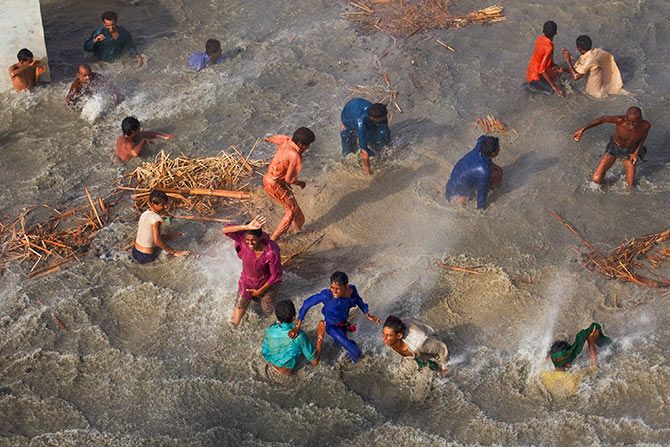Donald Trump denied it.
Hillary Clinton avoided saying it.
But the Climate Change crisis is frighteningly real.
Sunita Narain on what a Trump presidency and Brexit mean for planet Earth.
And yes, you are in danger too.

What does Donald Trump as US President mean for climate change?
Also, what does Mr Trump as President mean for our inter-connected and by now highly globalised world?
Let's discuss climate change first.
Let's note that Mr Trump is not the only climate-denier in the US. All Republican nominees and even Democratic candidate Hillary Clinton avoided using the "C" word during the election campaign. But there is no doubt that President-elect Trump is of another shade of this grey. He denies climate change is happening. He is certain that the US needs to dig more coal, build more power plants and do everything to ramp up production, which will increase greenhouse gas emissions. So, he is bad news for climate change.
But this is not new. The US has invariably made the multilateral world change rules; reconfigure agreements, mostly to reduce it to the lowest common denominator, all to get its participation. Then when the world has a weak, worthless and meaningless deal, it will walk out of it. All this while, its powerful civil society and media will hammer in the point that the world needs to be accommodating and pragmatic. "Our Congress will not accept" is the refrain, essentially arguing that theirs is the only democracy in the world or certainly the only one that matters.
We know that the Paris climate agreement will not keep the planet's temperature rise below 2°C, forget the guardrail of 1.5°C. It was designed to please the Americans who said they would never sign a global agreement that binds them to actions or targets.
Paris fatally and fundamentally erased historical responsibility of countries and reduced equity to insignificance. This was done because the US said this was the red line -- nothing on equitable rights to the common atmospheric space could be acceptable.
Also, the Centre for Science and Environment's analysis of US climate change action plan in the report, "Capitan America," showed that even under Barack Obama the proposals were business as usual.
So the world has tiptoed around equitable rights, was bent out of shape and scraped the bottom of the barrel. All for nothing.
Let's now turn to what the Trump era means for globalisation.
It was in the 1990s that the world stitched the global trade agreement and made rules for free, unfettered movement of goods. It wanted an interconnected world, where cheap labour could be used to enhance corporate profits. It got this. The two decades that followed saw the amazing rise of China as a provider of these goods; it also saw consumption increasing manifold.
It was also in the 1990s that this same world agreed that there was a need to moderate economic globalisation so that climate change could be mitigated. This was ecological globalisation, its counter to economic globalisation. But it failed.
Trade won over climate; consumption won over emission control. The success of economic globalisation showed up in the balance sheet of emissions: The carbon dioxide (CO2) emissions of the rich who gobbled up these goods did not decrease and the CO2 emissions of the countries which manufactured these increased. The planet was fried.

This is where we are today. We have Mr Trump, who openly denies climate change and has won elections. A large majority stands with him. Calls for protectionism are growing in this already rich world. The UK's Brexit vote is also a testimony to this anger.
It is the revenge of the rich, who did not get richer. It is the revenge of the educated; the well-off who believe they are entitled to more and that this is being taken away from them by the "others".
This is also a time when the already developed world, which has long exhausted its quota of the global atmospheric space, wants to burn more fossil fuel for its growth. It believes it is growth-deprived.
The key reason for all this is the fact that globalisation increased inequity. This is at the core of the problem today. This is also the core of climate change — ultimately, if emissions are linked to economic growth, then the question is how this growth will be shared between people and between nations.
Economic and ecological globalisation are about making rules that benefit people and the planet, not in ways that some get richer or that we blow up the planet. This is what we need to work on in the present world.
But this demands a change in the narrative. For too long, the two discussions on growth and climate change have been separated. For too long, we have been told that we cannot discuss the issues of equitable growth and equitable allocation of the carbon budget. This is what needs to change.
But for this, for once, let's move beyond shadow-boxing. The election of Mr Trump should teach us that the divisions are deep; the crisis is real. It is time to wake up. Otherwise, we will be in denial. And the climate-deniers will have the last laugh.
Sunita Narain is at the Centre for Science and Environment.











